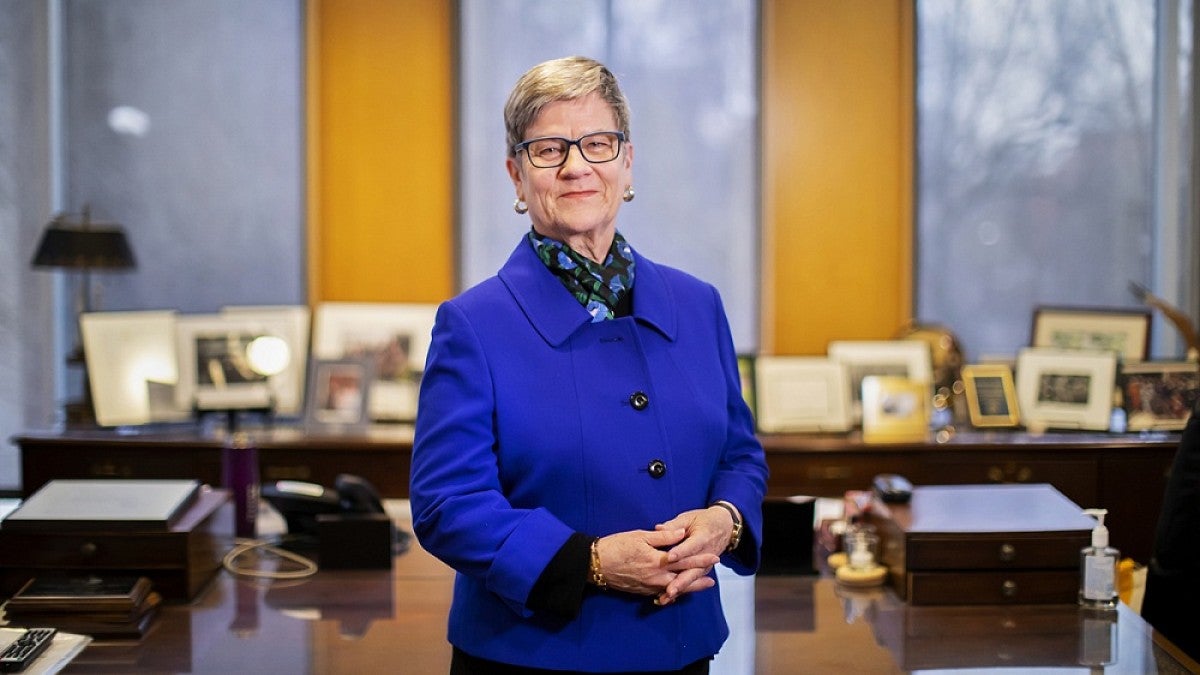Editor's note, 3/9/20: This event has been canceled due to COVID-19 concerns. Information on possible rescheduling of the event will be released at a later date.
Acclaimed author and science communication expert Kathleen Hall Jamieson will visit the University of Oregon in March to share her perspectives on public distrust of science and the possibility of Russian interference in the 2016 presidential election.
The Center for Science Communication Research is bringing Jamieson to campus to deliver the School of Journalism and Communication’s annual Richard W. and Laurie Johnston Lecture on “Communicating the Trustworthiness of Science.” Her talk will address questions such as what fuels the public’s distrust of science, media narratives and how to decrease the polarization of scientific findings.
Jamieson recently received the prestigious National Academy of Sciences Public Welfare Medal for her work to promote unbiased facts in public discourse.
“The language and narratives of science matter,” Jamieson said. “This lecture answers how and why.”
The Johnston Lecture, which will take place March 11 at 5:30 p.m. in the Redwood Auditorium in the Erb Memorial Union, is free and open to the public, but registration is requested. The talk is co-sponsored by the Phil and Penny Knight Campus for Accelerating Scientific Impact and the Wayne Morse Center for Law and Politics.
On March 10, Jamieson will also deliver “Russian Hackers, Trolls and #DemocracyRIP,” a talk synthesizing her work on the 2016 presidential election, including her award-wining book “Cyberwar: How Russian Hackers and Trolls Helped Elect a President.” Drawing on her research on unique polling data, her analysis of hacked content used by the press and years of media effects research, she will lay out her case for why the Russians most likely had a hand in electing Donald Trump.
“The 2016 Russian intervention forecast the things to come,” Jamieson said. “The lecture will ask what we can expect and what we should do about it.”
“Russian Hackers, Trolls and #DemocracyRIP,” co-sponsored by the Wayne Morse Center for Law and Politics, will take place at 7 p.m. in Room 175, Knight Law School.
Jamieson teaches at the University of Pennsylvania’s Annenberg School for Communication and is the director of the Annenberg Public Policy Center, which she founded in 1993. She has written several award-winning books and papers, including “Implications of the Demise of ‘Fact’ in Political Discourse,” which received the American Philosophical Society’s 2016 Henry Allen Moe Prize.
“Kathleen is one of my personal heroes in academia,” said Ellen Peters, director of the Center for Science Communication Research. “Her theoretical work is groundbreaking and important, and her applied research is both elegant and impactful. She is the epitome of our vision at SCR to lead cutting-edge science communication research.”
Jamieson co-founded FactCheck.org, which works to reduce deception and confusion in U.S. politics, and SciCheck, which focuses on false and misleading scientific claims intended to influence public policy. She is a member the American Philosophical Society, the International Communication Association, the American Academy of Political and Social Science and the American Academy of Arts and Sciences.
“SCR sponsors a variety of activities for students and faculty,” Peters said. “They range from experiential learning opportunities to external lectures. We are honored to host Dr. Hall Jamieson, who, like our other external speakers, will add immensely to our repertoire of questions to ask and tools to answer them.”
The annual Johnston Lecture series, which brings top-tier professionals to campus for stimulating lectures, discussions and workshops, is funded by charitable donations from the Johnston family, George E. Jones of U.S. News and World Report and the Correspondents Fund.
—By Kyra Hanson, School of Journalism and Communication


